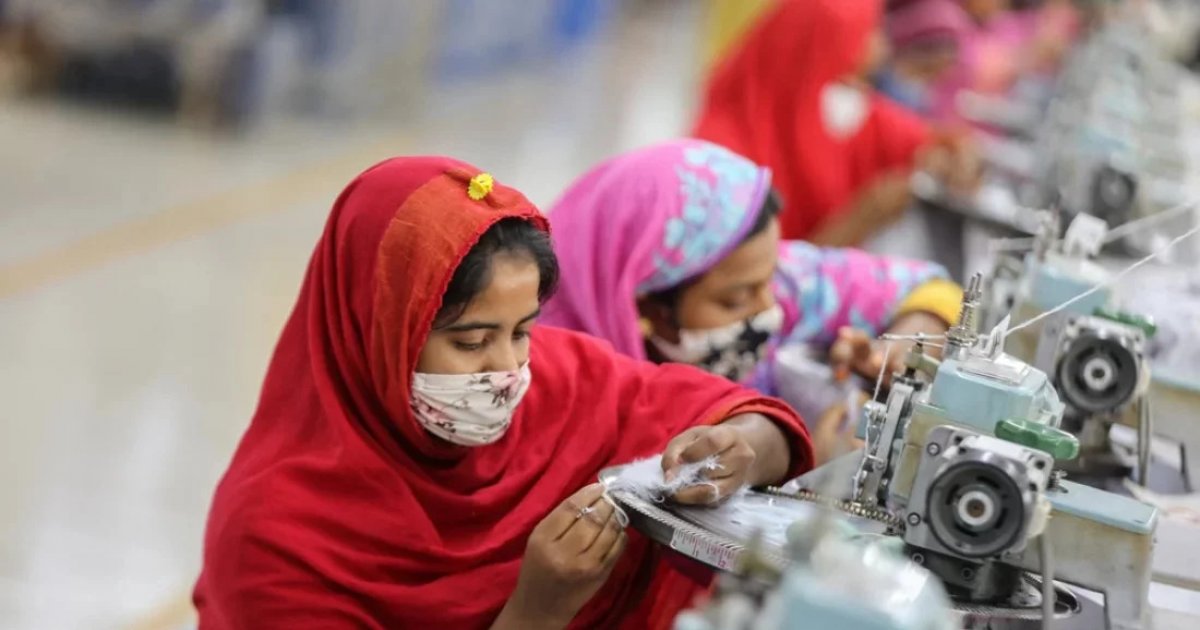The readymade garment (RMG) industry of Bangladesh is a source of national pride, provides jobs to over 4 million workers, the majority of them women, and has transformed the country into one of the world’s leading garment exporters.
However, there is a dark irony underlying the prosperity: The very laws passed to ensure protection of the workers fails in practice, leaving them exposed to exploitation, unsafe working conditions and most importantly delayed wages.
The Bangladesh Labour Act, 2006 (amended 2018) specifically addresses workers’ rights. These consist of a minimum wage, a limit on working hours, compensation for working overtime, workplace safety measures.
Section 100,101 and 102 of the Bangladesh Labour Act set out limits on working hours, while Section 132 establishes essential safety measures to protect employees in the workplace. In addition, Section 148 mandates the timely payment of wages, ensuring that RMG workers are not deprived of their rightful earnings.
Beyond national legislation Bangladesh is also a party to international labour standards, including ILO conventions, and agreements such as the Accord on Fire and Building Safety, formed to prevent tragedies like Rana Plaza collapse.
Although laws regarding safety appear solid on paper, in reality the majority of garment workers continue to be exposed to dangerous working conditions, wage theft, intimidation, and harassment.
Reports by NGO and media outlets frequently reveal factories with inadequate fire escapes, faulty electrical work, or blocked emergency routes, willfully violating labour laws.
Bangladesh has fewer than 1,500 labour inspectors for millions of workers. Inspections are often scheduled in advance, allowing factories time to preliminarily “tweak” obvious infractions.
In addition, fines for infractions are typically too low to make compliance profitable (Brook Law, 2023). Though the law allows for prosecution of employers that withhold wages or maintain unsafe workplaces, actual implementation is delayed, sporadic, and in scope.
The employees themselves are discouraged from pursuing their rights. Fear of being fired, blacklisted, or harassed discourages them from complaining. While Section 24 of the Labour Act prohibits retaliatory acts by the employer, in reality, employees who lodge grievances are dismissed or blacklisted.
This creates a scenario wherein the law exists, yet employees are not able to apply it safely. For example, in 2019 after strikes in mid-January, union leaders have reported at least 7,500 garment workers were suspended from their jobs. Some of those dismissed were accused of vandalism and looting, but the allegations appeared broad and vague (Human Rights Watch, 2019).
Non-compliance with wages is another perennial issue. Despite statutory protection of minimum wage, there are many employees getting less than the statutory wage, while overtime is not paid or underpaid.
Wages are withheld for months in some cases. While the law prescribes penalties, including fines and even imprisonment for certain wage-related violations, these sanctions are rarely enforced and are too weak to compel consistent compliance.
The fact that there is no basic legal knowledge among workers exacerbates the situation. Few know their rights under national law or international labour standards.
NGOs and trade unions provide some training, but coverage is weak, and few employees are conscious of how to complain or seek legal redress. Without this consciousness, workers cannot hold illegal practitioners accountable, and abusive bosses go on unpunished.
Its consequences are real and human. Insecure working conditions, non-payment of wages, and harassment affect the health, family life, and social dignity of workers.
Women, who are the overwhelming majority of workers, are particularly vulnerable to harassment, discrimination, and economic subordination. Despite legal safeguard, plant accidents, fires, and collapses still occur, showing the ongoing gap between law and reality.
What to do?
- The state and private sector must advance in tandem. Labour inspections must first become regular, unpredictable, and empowered to fine seriously. Inspections must not simply document abuses but reward good ones.
- Good grievance mechanisms must be empowered so that workers can report abuses confidentially and without fear of reprisal.
- Legal literacy training must be made mandatory in factories, giving workers a grasp of what they are entitled to and how to enforce it.
It is also the responsibility that they should audit supply chains rigorously, remit wages in time, and not trade with factories violating laws. Responsibility cannot be at borders only. International consumers benefit from low costs of production; they should ensure that these benefits are not achieved at the cost of human dignity and safety.
The media and civil society can contribute to the cause through public campaigns, in-depth reporting, and advocacy. Workers’ voices must be raised, not silenced, and the public must demand openness and responsibility from policymakers and factory owners.
Bangladesh’s garment and workers’ rights must not be an illusion of the law, existing only on paper. Ensuring justice, security, and dignity for every garment worker is achievable but only when laws, enforcement, and corporate social responsibility join forces.
Without change, we risk perpetuating a vicious cycle in which economic development is paired with human suffering, and legal protections are widely symbolic.
Action can no longer be delayed. Hardening enforcement, ensuring fair wages, providing workers safe working conditions, and educating workers aren’t legal niceties, they are moral imperatives. Only then can Bangladesh claim that its garment industry is not only thriving but also equitable, humane, and sustainable.
Tashdia Tarafdar Ridisha is a freelance contributor and a student of Law.



